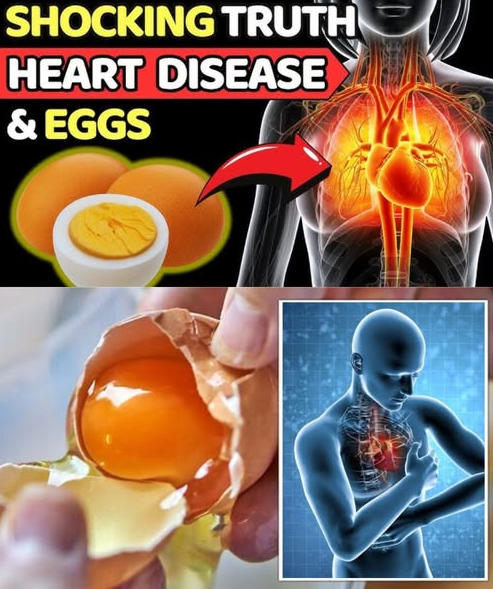
Cracking the Egg Myth: What’s Really Going On?
For years, eggs have been tossed around like a hot potato in the world of heart health. One minute they’re praised as a superfood, the next they’re vilified for their cholesterol content. So what’s the truth? Are eggs silently sabotaging your arteries, or are they actually doing your heart a favor?
Let’s crack this myth wide open and get to the yolk of the matter—based on real science, not fear.
Do Eggs Really Raise Your Cholesterol?
This is the big question that’s haunted breakfast tables for decades. Yes, eggs contain cholesterol—about 186 mg per large egg, all tucked neatly in the yolk. But here’s the twist: your body doesn’t just sit there and let cholesterol pile up. It adjusts.
When you eat more cholesterol from food, your liver dials back the cholesterol it makes. For most people, this balancing act keeps blood cholesterol levels in check.
What the Science Says
A major study from the American Journal of Clinical Nutrition found no link between eating up to one egg per day and an increased risk of heart disease in healthy adults. In fact, it suggested that eggs might help boost HDL cholesterol, the “good” kind that sweeps away the bad stuff.
In other words: for the average person, eggs aren’t the villain they’ve been made out to be.
Eggs Offer Heart-Healthy Nutrients Most People Ignore
Take a look beyond the cholesterol label, and you’ll see that eggs are nutrient-dense little powerhouses that can actually support heart health.
- Omega-3 Fatty Acids: Especially in pasture-raised eggs, these good fats reduce inflammation and help regulate blood pressure.
- Choline: This essential nutrient supports brain and heart function. Most of us don’t get enough.
- Lutein and Zeaxanthin: Antioxidants that protect your arteries from oxidative stress—the kind that can damage blood vessels over time.
- Protein: Eggs contain high-quality protein that balances blood sugar and keeps your appetite in check—both key for heart health.
So yeah, eggs are more than just cholesterol—they’re nutritional gold.
Video : Eating Eggs Increases the Risk of Dying from Heart Disease
What If You Have Heart Disease or Diabetes?
Now, if you already have heart disease, diabetes, or high cholesterol, you might be wondering: can you still eat eggs?
Short answer: yes—but with a few tweaks.
- Stick to 3–4 eggs per week (unless your doctor says otherwise).
- Cook smart: Skip the butter-fried bacon-and-eggs routine. Instead, go for boiled, poached, or lightly sautéed eggs.
- Pair wisely: Combine eggs with leafy greens, avocado, or whole grains—not white toast and sausage links.
It’s often not the egg that’s the problem—it’s what comes on the plate with it.
The Real Villains Behind Heart Problems
Let’s be real. Eggs have been blamed for years, while far bigger threats have flown under the radar. If you’re worried about heart health, here’s where your focus should be:
- Trans fats: Found in baked goods, margarine, and junk food—these are artery wreckers.
- Processed meats: Bacon, sausage, deli meats—delicious but deadly when eaten too often.
- Sugar: Excess sugar (especially in drinks) spikes insulin and drives inflammation.
- Refined carbs: White bread, pastries, and other processed carbs are sneaky contributors to heart disease.
Pointing fingers at eggs while ignoring these is like blaming a single cracked tile for a crumbling wall.
How to Eat Eggs the Heart-Healthy Way
If you love eggs—and let’s be honest, who doesn’t?—here’s how to enjoy them without guilt:
- Buy pasture-raised eggs if you can. They have higher omega-3 content and better nutrient profiles.
- Cook them gently: Hard-boiled, soft-scrambled (with olive oil), or poached are ideal options.
- Skip the butter and bacon sides: Instead, add spinach, tomatoes, mushrooms, or avocado.
- Balance your plate: Use eggs as part of a balanced breakfast or lunch, not the only thing on your plate.
Eggs shine brightest when they’re part of a whole-food, nutrient-rich lifestyle.
Video : The Shocking TRUTH about Eggs and Heart Disease
Conclusion: Eggs Aren’t the Enemy—They’re Part of the Solution
So, should you eat eggs if you care about your heart? Absolutely—just not ten at a time with a side of fried hash browns.
Eggs are affordable, versatile, and jam-packed with nutrients your body (and your heart) actually needs. If you’re eating a mostly whole-food diet, moving your body, and keeping processed junk to a minimum, enjoying a few eggs a week is not only safe—it might even help you.
Next time you’re whipping up breakfast, pair that egg with sautéed kale and whole grain toast instead of buttered white bread. Your taste buds will still be happy—and so will your heart.


